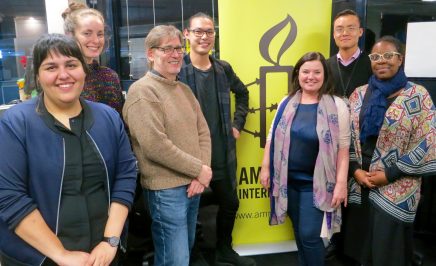On Human Rights Day, Amnesty’s Jessie Mawson shares her actionable and hard-won advice for protecting, defending, and promoting human rights in contested online spaces.
“Don’t read the comments”.
“Don’t feed the trolls”.
Erm, okay. Good advice, I guess. But what if talking to people in comment threads (about contentious human rights issues, no less) is literally part of your job description?
That was me, a few years back, when I walked into a brand new job at Amnesty International’s Aussie HQ in Sydney. Among other things, I’d been tasked with managing and growing the organisation’s presence on social media.
The following days and months, spent knee-deep in Facebook comment threads and Twitter mentions, got me thinking a lot about the nature and value of conversing with people who disagree with us. Particularly online (as distinct from privately or face-to-face). And particularly about high-stakes and often complex issues like the death penalty, offshore detention of people seeking asylum, justice for Indigenous people, the legal status of sex work, and the sovereign rights of nation states.
As human rights defenders, is this the best use of our time and energy?
By engaging our opponents, do we risk legitimising and perpetuating their views?
It is actually possible to change someone’s mind in this way, using this medium?
This year, I’ve found myself revisiting these same questions in the context of an increasingly polarised political landscape, characterised by partisan slogans, inflammatory tweets, and media mudslinging; and a series of bottom-up social media ‘moments’ like #MeToo and the Australian marriage equality debate that really seemed to ratchet up the frequency and intensity of political debate in my timeline.
I don’t have any definite answers to these questions yet.
What I have is this: A (somewhat motley) list of tactics and principles that I do feel sure about. Collected over the last four years, I like to hang this list up next to my desk and keep it close to hand as a kind of litmus test for my choices, big and small. I use it as a tool to help me focus my effort on being good and being effective.
Today is Human Rights Day, so I’m sharing this list to encourage you to start or join a conversation about the human rights issues that matter to you today.
1. Tell your own story
We all know from experience that hearing someone speak from their heart, in their own words, about how a human rights issue affects them personally is incredibly powerful.
Academic and organiser Marshall Ganz talks about this idea as the ‘public narrative’ approach, and teaches people to share their own unique ‘story of self’ as a way to connect with and persuade others.
A good place to start is by simply using ‘I’ statements in online conversations about the big issues; or example, “I was shocked when I learned how awful conditions on Manus Island are for refugees”.

2. Values first, information second
Is there anything more frustrating than seeing someone be just objectively, factually wrong on the internet? It’s lucky I’m here to correct them with all my credible facts!
But wait. The studies show that just presenting someone with different information rarely works. As cognitive linguist and philosopher George Lakoff says, “facts bounce off frames”, so the key to persuasion is really to re-frame the way a person thinks and feels about an issue.
One way to do this is to connect people with their highest values (like compassion, justice, equality – ideas everyone subscribes to) and prompt them to reason from there.
3. Be a good ally
If you’re not impacted directly by a specific human rights issue, make sure you’re being a good ally to folks who are.
That sometimes means stepping up; involving yourself in difficult conversations and shouldering some of the weight of that work in a way that lessens the burden for affected communities.
At other times, it means stepping back; creating space so that the voices of affected communities can be heard loudest.
To figure out which, listen. If you’re still not sure, ask. If you get it wrong, say sorry and try to do better next time.
4. Be kind – to yourself and each other
Kurt Vonnegut’s, ‘Be kind, babies’ is pretty much my go-to advice for all things in life, including comment threads.
Kindness is good because, well, it’s just inherently good. But also because it’s effective. Nobody is inclined to listen to the opinions of someone making them feel awful. That’s why I’m generally wary of public shaming and social media ‘pile-ons’ as tactics for social change.
Being kind to myself means knowing when to turn off my phone for for a bit, and when to walk away from online conversations that have turned nasty and unproductive.
5. It’s not what you know, it’s who you know
Amnesty has been around for more than 50 years. We’re the world’s biggest human rights organisation. We’ve won a Nobel Peace Prize. So yeah, that old candle has some street cred for sure.
But for the people in your social network, hearing about an issue from Amnesty will be less persuasive than if they hear about it from you: their aunt or cousin or former classmate or hairdresser or sports club member or friend-of-a-friend or however you fit in.
So remember that, while talking to strangers is fine, the biggest impact you can make in advocating for human rights online in within your own social circle.
Inspired to put these ideas into practice? Great! Today is Human Rights Day so it’s the perfect time to get chatting about the issues important to you over on Amnesty’s Facebook page.









